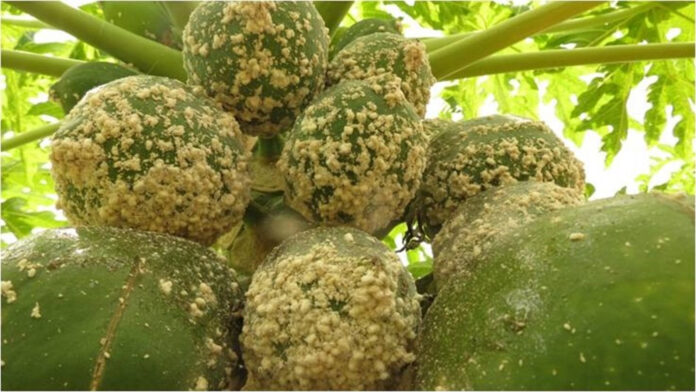CABI continues to be quite advanced in safeguarding livelihoods and food security from the papaya mealybug, with the latest activities concentrating on five additional major papaya-growing counties in Kenya.
In what might be a milestone in the onslaught against this pernicious pest, researchers from CABI’s regional centre for Africa, based in Nairobi, deployed Acerophagus Papayae, an environmentally benign biological control agent.
This will increase the number of target counties to eight, with new additions consisting of Machakos, Makueni, Embu, Tharaka Nithi, and Baringo.
Funded through the CABI-led PlantwisePlus programme and the Darwin Initiative project ‘Biocontrol of papaya mealybug in East Africa’, the initiative supports more than 150 plant clinics across the country in helping farmers with issues affecting the health of their plants.
The papaya mealybug is native to Central America and was first detected in Africa in 2010; because of this, it has great potential for economic damage, with predictions of crop loss at about Sh. 365,086 (£2,224) each hectare per year.
Alex Kituku: Meet graduate making a fortune from selling pawpaw seedlings
Already successful outcomes have occurred in Mombasa, Kwale, and Kilifi, where the biocontrol agent significantly reduced pest populations and almost doubled papaya harvests in farms treated with the sprayed biological control agent.
The applied Integrated Pest Management strategies differed across these achievements, although they have in common the minimization of chemical pesticide use to support the efficacy of applied biological control agents.
According to Dr Selpha Miller, who is in charge of research and deployment at CABI, regarding its effectiveness, Acerophagus Papayae can confirm a high ability for effective control of the pest up to six months post-deployment.
The success and adaptability of this parasitoid in various Kenyan environments make it a key player in sustainable pest management. This gives smallholder farmers hope for better crop yields and improved livelihoods.








